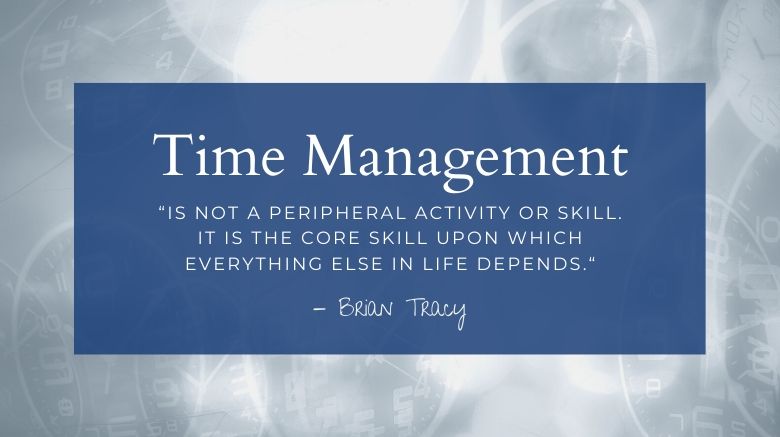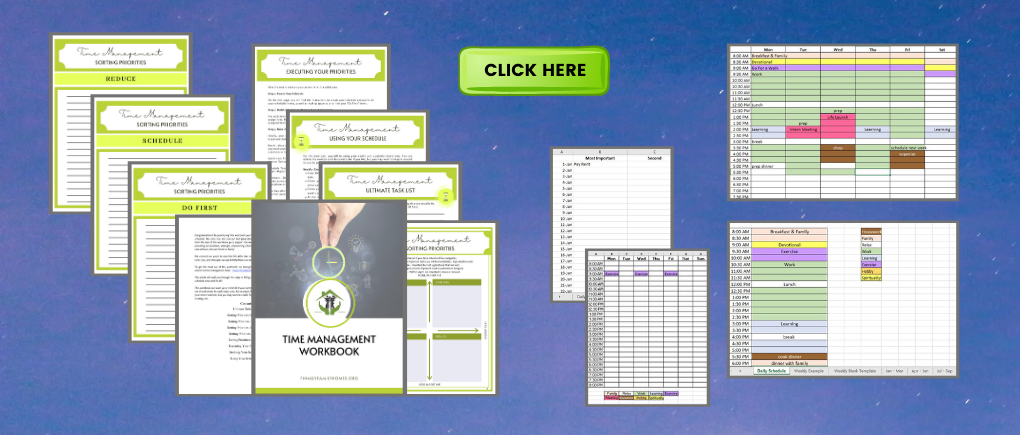How to Manage Time Wisely – 5 Time Management Strategies
Has your to-do list has gotten out of control? Maybe you’re asking, “How can I improve my time management skills?” You’re at the right place. We’ve put together a step-by-step process to help you figure out how to manage time wisely along with 5 key strategies to help you stay on track.
As you rise up the ladder of success, it feels like your time shrinks. The more successful you get, the less time you have. The information below will equip you to better manage your time so that you can be more effective and achieve your goals faster. We also provide some great time management quotes to inspire you.
Time Management
As you pursue how to manage your time wisely, it’s important to understand the definition of good time management. If you want to succeed at anything, you must understand exactly what you are aiming for.
A word of warning: as you work to improve the use of your time, it may feel like a waste of time. Planning sometimes doesn’t feel productive, but it’s absolutely essential to making the best use of your time. It’s an effort that will pay off in spades.
Time Management Definition
Let’s start with a time management definition. Here’s how we define good time management.
Time management is the process of intentionally structuring your schedule to best serve your goals. It requires strategically organizing tasks to maximize productivity. Good time management means organizing your time intentionally and prioritizing activities that most efficiently advance you towards your goals and honor your values.

This post contains affiliate links. We earn commissions to support youth in need if you shop through the links on this page. Read our affiliate disclosure here,
Below you’ll find a step-by-step guide to managing your time more wisely along with some great tips and tools to help you along the way and we also offer an incredible set of TIme Management Tools on Esty to help you actually follow through with the guidance below.
Time management is also referred to as productivity. You’ve probably heard of some of the top experts in this field, like Tim Ferriss, Craig Jarrow, or David Allen. These guys are next-level, high-performance advisers to the most successful people in the business world, but a little intense for the beginner.
The Benefits Of Time Management
You may be asking, “How can I make myself be more productive?” It helps to have a solid motivation – to understand why it’s worth the effort to pursue time management practices.
Why take the time to get good at time management? Good time management is essential to success. And it’s not limited to success in the workplace. Success as a friend, parent, spouse, fitness, anything… requires good time management skills.
Achieving success in any endeavor requires giving it the proper amount of time at the right time. Time is one of the most valuable commodities that you have. Taking the time to learn how to manage your time is a very good use of your time.
It’s easy to let the seemingly urgent tasks of life crowd out the more precious and lasting priorities such as faith and family.
Living out your priorities and achieving your goals requires being intentional and disciplined.
Time management is a particular challenge for young adults just launching out on their own. According to this article about half of the college kids surveyed felt like they were underperforming due to poor organizational skills and 88 percent of the college students said they want to improve their ability to manage their time.
“Until we can manage time, we can manage nothing else.”
Peter F. Drucker
For most young adults, their schedules and priorities have been managed for them. Independence means unprecedented freedom and responsibility. Not knowing how to manage their time leads to missed deadlines, increased stress, and poorer performance at school or in the workplace. This is a particular struggle for youth who age out of the foster care system.
“Time is money,” they say. But maybe time is more valuable than money.
As founder and CEO of Life Hack, Leon Ho put it
“If you lose money, you might get a chance to make it back; but a wasted hour is irreplaceable.”
Leon Ho
Our Number One Time Management Tip
Our number one time management tip is to that spending time on prioritizing and deciding what’s most important is the most valuable use of your time. Otherwise, you are almost guaranteed to use your time poorly – even if you stay very busy.
Being busy doesn’t mean you’re being productive. You can be very busy, without living out your priorities or moving closer to your goals. It’s a frustrating and disappointing place to be and not a good use of your time. You must learn what your most important tasks are and how to prioritize them.
As you probably know we are living in an age of unprecedented speed and volume of information. This has led many of us to feel like we are dealing with an information overload. But according to David Allen, creator of the “GTD” (get things done) method, when we get stuck, it’s not due to an issue of information overload, but a decision-making overload.
It’s the unplanned, in-the-moment decision-making that most often kills productivity.
This can be a particular challenge for struggling youth who are often in a “get through this moment” mindset. Time management skills are not something most people do well at without intentional guidance.
Aging out foster youth have the added challenge of trauma, which inhibits executive functioning in the brain (where you plan, prioritize, and do other tasks necessary to time management). Without learning time management skills, these youth often fail in the workplace and school.
Five Steps To Better Time Management
Sometimes it’s really hard to know where to being when getting anything organized. Time is no different – maybe even more challenging to organize, being intangible. So we’ve put together these five steps to help you figure out where to begin and keep going forward as you learn how to manage time wisely.
Step 1. Define Your Goals.
If you aren’t clear about your goals, values, and priorities, it’s hard to make a plan and hard to make a good decision on the fly. Get specific, write them down. Maybe get a planner.
Good time management requires planning and conscious decision-making. It requires defining your priorities and choosing to put them first. It requires being aware of how you spend your time.
When your friends invite you out to a party the night before a big test, and you haven’t established that you want to get an A in chemistry, then you probably aren’t going to prioritize staying home and studying.
Step 2. Download A Complete List Of Your Activities
Make a list of everything you need to do and add anything else you usually do. While this may sound burdensome, it’s more important than it appears because it:
- Lightens your mental load
- Reveals nonproductive activity
- Helps you get a picture of your current workload
- Clarifies which tasks you may need to work into your schedule
There may be goals you are supporting that you don’t realize for better or worse. For instance, perhaps you may realize that you spend time doing the dishes, washing your laundry, and taking a shower.
Individually, these may not end up on your goal list, but they reveal something you probably value – being clean. Those activities need to be accounted for if you don’t want to find yourself out of clean underwear.
It’s important to write down your to-do list because your brain can’t operate at its best when you try to keep track of all your to-do’s in your head.
Rather than solving problems, it’s repeating your to-do list.
As a mom/house manager, this article really speaks to how the mental load affects moms.
This Time Management Technique Improves Your Performance
Let me give you another example.
Let’s say your brain is a smartphone. You’ve been taking pictures and your phone storage is full. It’s operating slow and refusing to take more photos. What do you do? Upload.
You get those photos off of your phone so that your phone can continue operating as a phone, not a photo warehouse.
An efficient mind works the same. At some point, you can become overloaded with things to do. In order to clear some working space, you need to upload so that your brain has space to think and create, not just store repeated meaningless information “I gotta clean that closet.”
Dump everything from your brain that relates to anything you need to do over the course of several hours. Don’t worry about forgetting something important, you can always add or adjust as more comes to mind. And it will.
Also, don’t be concerned about repeating yourself. This will help you see how you have thoughts cycling through because they are unresolved. Record every little “I need to / want to” that passes through your mind.

Step 3. Prioritize Your Activities with a Time Management Matrix
The Eisenhower matrix is one of the most popular time management tools, especially for setting priorities.
And yes, it’s named after our 34th President Dwight D. Eisenhower!
Advice from the two-term President, 5 Star General, and the first Supreme Commander of NATO is worth listening to!
Oh, and did you know this guy squeezed in over 800 rounds of golf during his Presidency?
In short, this tool works by having you sort your task list into four categories.
- Do First – This is where you put your most urgent and important tasks
- Schedule – These tasks are important enough to get on your calendar, but not urgent and can be done later.
- Assign – These are tasks that are urgent, but not important enough to take from your limited time. These can be delegated or automated.
- Diminish – Neither urgent nor important, these are tasks to remove, reduce, or do only for fun in your after-hours.
James clear recommends removing it, as he says:
“There is no faster way to do something than not doing it at all.”
James Clear

Step 4. Plan Your Schedule.
You now should have all the information that you need to make a solid plan. Set up a blank calendar. It can be a spreadsheet, paper, or application.
- Schedule your time inflexible, high priority activities first
- Schedule your deep or hard work around your highest energy levels.
- Figure out when your brain is most engaged & schedule your hardest studying or most challenging and important tasks then, in 15 – 45 minute chunks of time
- Schedule 15-minute breaks around your deep work
- Fill in your schedule with your lower priority activities
- Remove the lowest priority items altogether or set them aside as “schedule treats” (more on that below).
Step 5. Develop Strategies To Keep You On Plan.
Remember, it’s the unplanned in-the-moment decision-making that most often kills productivity.
The purpose of the plan is to have the decisions made so that you can confidently focus your energy on actions that are worth your time at the right time.
This doesn’t mean your schedule won’t require some tweaking and flexibility, especially as you get started; but as a default, stick to the schedule.
5 Time Management Strategies
Need some help to keep yourself on task? Here are five-time management strategies that will keep you motivated to stick to your plan.
1. Set artificial deadlines to create space and structure.
Do you need to be there at 3 pm?
Aim for 2:45 pm.
Do you need to get through your emails?
Set a deadline to empty your in-box by Friday noon.
Blog post taking too long to write?
Set a timer to finish the first draft.
2. Give yourself “schedule treats.”
Schedule treats are low value, but fun or relaxing indulgences
– this might be something like scrolling through social media, listening to music, meditating, reading, etc
Did you get there early?
Spend your waiting time catching up on Instagram.
Did you empty your email inbox early?
Spend your extra time reading a favorite book.
3. Pick your top 3 activities for each day.
You can either choose the night before or the morning of.
Maybe you make the list the night before and re-evaluate in the morning. Whatever the case, start your day by being clear on your priorities.
In addition, I find it helpful to have a list of the most important tasks written out 1-3 months in advance. I pick one thing each day as my most important task – that one thing that is the priority over all else for that day. This bird’s eye view helps me see & plot out movement forward towards my goals more effectively.
4. Do similar little tasks together.
Batch task the little things 2-5 minute tasks
For example, do all your tasks that require driving together.
Or tack them on to your routine for 2 minutes or less:
Wipe your bathroom sink when you finish getting ready in the morning
Take out the trash as you head out the door
5. Multitask judiciously.
Honestly, most experts recommend ditching multi-tasking all together.
They say multi-tasking often only feels more productive. Some studies indicate it does more damage than good.
According to this article in Forbes, it “kills your performance and even damages your brain.” Others, myself included, find that combining low-importance tasks works well. So go ahead and listen to that audiobook while taking your morning walk.
Four Time Management Tools To Help You Be More Productive
The most productive people leverage their time by using tools to help them optimize their time. Here are few helpful time management tools worth investigating as you seek to become more productive.
Evernote
Evernote is a
Time Management Workbook
We’ve put all of the information here together and more in a workbook to walk you through figuring out your schedule, guiding you as you work out how to manage your time more effectively. We’ve made it easy! Get it on Etsy.

Google Calendar
Google Calendar might seem obvious, but I’m surprised how few people I know use it. You can use google calendar to sync across your devices, so appointment reminders pop up. It’s also very helpful for family scheduling.
You can create a calendar for each person in the family and sync them together. Instead of asking mom if we have anything planned, the whole family can look at the shared calendar to see what’s on the schedule.
Fiverr
Fiverr is the best for
“You will never find time for anything. If you want time you must make it.”
Charles Buxton
Download this quote as a wallpaper for your phone
Some Final Time Management Tips
Maybe you already know some of this and just haven’t taken the steps to get more productive. You may wonder, “Why is it so hard for me to be productive?”
Perhaps you don’t feel like you have time to manage your time. You think working faster in your current pattern will pay off. Remember, being busy doesn’t mean you’re being productive. In fact, busyness can be a barrier to true productivity.
Making time for time management is like using a wish to ask for more wishes. It pays off in spades. Just like learning how to organize your space, the upfront load of work – filtering, prioritizing, and discarding – will make your life easier and more productive for years to come.
Ready to take it to the next level? Download your FREE time management printable from our Time Management Workbook on Etsy!
One purpose of this blog is to help parents of teens navigate the challenges of preparing their children to be successful independent adults. The mission of Finally Family Homes is to provide the same kind of support for those teens who don’t have a family or home to help them transition into adulthood.
If you liked this post, you’ll probably love:
How to Set Goals In Life
Not sure where to go next?







